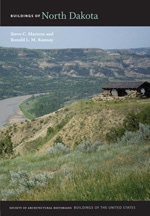You are here
Devils Lake Central Middle School (Devils Lake Central High School)
Prominently visible from the commercial district as the terminus of 4th Avenue, the PWA-funded Art Deco school was the product of an unusual architectural collaboration. Scottish-born Marshall came to Devils Lake in 1905 after working as an architect and contractor in Indiana, Nebraska, and Chicago, Illinois. Fisher, a well-known architect from St. Cloud and Bemidji, Minnesota, was invited by Marshall to collaborate on this commission because of Fisher’s substantial experience with school design. The two architects also partnered on the Devils Lake War Memorial building (1934; 510 4th Avenue NE). At the time of his death in 1949, Marshall was reportedly the oldest architect in the state.
The school is of light-colored brick, extensively highlighted with geometric Art Deco motifs in limestone. Front windows are accented with vertically fluted limestone pilasters. An entrance stair tower provides access to a rather lavish interior with terrazzo floors, Italian and American marble, extensive ornamental plasterwork, and stylized lighting fixtures.
Writing Credits
If SAH Archipedia has been useful to you, please consider supporting it.
SAH Archipedia tells the story of the United States through its buildings, landscapes, and cities. This freely available resource empowers the public with authoritative knowledge that deepens their understanding and appreciation of the built environment. But the Society of Architectural Historians, which created SAH Archipedia with University of Virginia Press, needs your support to maintain the high-caliber research, writing, photography, cartography, editing, design, and programming that make SAH Archipedia a trusted online resource available to all who value the history of place, heritage tourism, and learning.


















